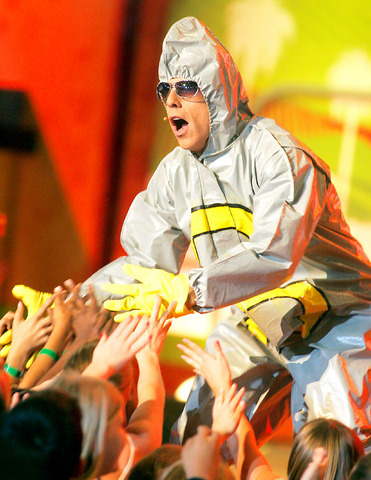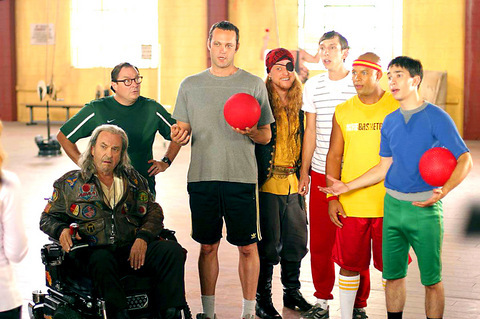One has a broken nose. Another a rubber face. The short, chubby one doesn't even brush his hair. And yet these are the new kings of Hollywood. Will Ferrell, Ben Stiller, Vince Vaughan, Jack Black and Owen Wilson operate as an unofficial repertory company. The group, which revolves around Stiller, are friends, with some relationships going back 20 years. From Dodgeball and Anchorman to Elf and Zoolander, they appear in one another's films so often you get confused as to whose movie you're watching.
What's more, the slacker pack has virtually shut the studios out of the development process. By coming up with their own concepts, finding screenwriters and then offering the whole package for production, they are reshaping screen humor.
"Right now, they're the ruling oligarchy in terms of comedic films," confirms OK's LA columnist Ashley Pearson. "And they've managed to translate that worldwide. Often, American comedies don't do well overseas because of different cultural sensibilities. But they've managed to find things that are universally funny without going for the easy laugh. They're able to inject all the different elements -- romantic comedy, drama and slapstick -- into a new genre.

PHOTO: REUTERS
"And they play against each other as comic foils."
"What all these guys have in common," says Greg Gutfeld, the American-born editor of UK Maxim, "is they're not out to show that they're cooler than you are by bringing you down. They don't operate with wise-ass humor. Most of their comedy is directed at themselves; it's a self-loathing kind of humor that is more disarming. They enjoy making themselves look idiotic and, if you think about it, that's really, really smart."
"They're happy to approach sentiment," agrees Steve Coogan, who took part in a recent read-through of Stiller's latest film, Tropic Thunder. "They're very comfortable with vulnerability. British humor tends to be about the head and not the heart, there's a bit of a kneejerk reaction to sentimentality. What these films do is play to the strengths of actors like Ben Stiller or Jack Black, so it feels like a natural extension of character. It's very instinctual and organic."

PHOTO COURTESY OF FOX MOVIES
Ever since There's Something About Mary, Stiller's position as Hollywood's top comic antihero has been unshakeable. Rumor has it he rang his agent and said: "I have five words for you: Owen Wilson; Starsky and Hutch." Within days, he had sold the idea to Warner Brothers and landed a budget of US$60 million.
What Stiller et al have done is create a new brand of comedy that goes beyond the gross-out humor of the Farrelly Brothers. Next-generation humor is "smart-dumb" comedy, inspired in part by the films of Harold Ramis (Animal House, Caddyshack). Yes, there may be body fluids, but the writing is sharp and character-based. "Slapstick is stupid," argues Gutfeld. "Someone falling down, or getting a ball in the groin -- it's been done. But they seem to find new ways to make you laugh while they're enduring horrible pain. Will Ferrell is a pleasure to watch because you know he is almost indestructible."
Their films reach all demographics. Best of all, they are funny in a way that women don't find offensive. No wonder Nicole Kidman, Jennifer Aniston and Cate Blanchett want to work with them (Kidman handpicked Ferrell for Bewitched). "What a lot of these actresses can't do is be funny," says Pearson. "They put themselves with these sure-thing comedians to make it happen."
"Most people who meet these guys will tell you they're actually really nice people," observes Gutfeld. "You could go up and say hello to them on the street. They're like the antidote to Sean Penn. You see Sean Penn and you don't even want to go near him because he's such a misanthrope. He's the ultimate dead white male. I would never buy a magazine with Sean Penn on the cover, but I'd buy one with Will Ferrell. That's how guys think."
"I'm not sure they're nice guys exactly," laughs Pearson. "I mean Ben is pretty settled down with a second child on the way. But he's very, very difficult on set, which he himself admits. He's never happy with his performance; he's very hard on the other actors. It's not because he's a diva, but he's really committed to the work. As far as the other guys are concerned, Vaughan and Wilson are some of biggest party boys in LA. Owen has dated one lapdancer after another."
The comic actors started appearing on screen together in 1996's The Cable Guy. And the camaraderie goes back years to shared experience in grungy comedy clubs. Many of them performed improv on Saturday Night Live in the early 1990s, or the little-seen but influential Ben Stiller Show (Fox TV pulled it just as Stiller was awarded an Emmy with co-writer Judd Apatow).
Apatow met Stiller as a student and introduced him to Jim Carrey. Stiller became a fan of Wilson after seeing him in Bottle Rocket and called up the actor to propose collaborating. He had given Jack Black a role in The Cable Guy and used both Wilson and Ferrell in Zoolander. Other members of their clique include Luke Wilson, Owen's brother; Christine Taylor, Stiller's wife who appeared in Dodgeball and Zoolander, Meet the Fockers director, Jay Roach, and rapper Mos Def. "There is a semi-social scene where everyone bumps into each other," says Coogan. "But it's not debauched in the old Belushi generational way. It's much more professional. It's not rock 'n' roll."
Over the next few months, we'll be seeing a new wave of slacker-pack films including The Wedding Crashers, starring Vaughan and Wilson as bachelors who prey on women at weddings, and Kicking and Screaming, with Ferrell as a soccer dad, while Fun With Dick and Jane features Carrey and Tea Leoni as a couple who turn to robbery.
No one is claiming their humor is politically correct, but these actors are happy to play characters who are oddly insecure in their masculinity. Starsky and Hutch even had a homoerotic undercurrent.
"They're not ideologically committed in any way," says Coogan. "But it's not the same old macho humour. It's Just gay enough."
Coogan puts it down to an understanding of populist taste. "Comedy needs to have a broad appeal. In Britain, there's sometimes a feeling that comedy is terminally lowbrow in terms of art, a poor man's culture, and that is not the case in the US. If something's successful, then it's good. If it makes money, even better."
Not everyone agrees. Part of the appeal of these films has been their low production costs. Now the studios are being forced into bidding wars. "This is not what a studio wants to see happen," says Pearson. "Believe me, the number-one priority is finding a way to recreate this formula in a way it can control." Meanwhile, Stiller is in imminent danger of being overexposed (he's made eight movies back to back in two years). Roach, who directed him in Meet the Parents, wouldn't be surprised if he moved into more cerebral roles, like Bill Murray in Lost in Translation. Meawhile, Stiller has vowed to take a year off.

June 2 to June 8 Taiwan’s woodcutters believe that if they see even one speck of red in their cooked rice, no matter how small, an accident is going to happen. Peng Chin-tian (彭錦田) swears that this has proven to be true at every stop during his decades-long career in the logging industry. Along with mining, timber harvesting was once considered the most dangerous profession in Taiwan. Not only were mishaps common during all stages of processing, it was difficult to transport the injured to get medical treatment. Many died during the arduous journey. Peng recounts some of his accidents in

“Why does Taiwan identity decline?”a group of researchers lead by University of Nevada political scientist Austin Wang (王宏恩) asked in a recent paper. After all, it is not difficult to explain the rise in Taiwanese identity after the early 1990s. But no model predicted its decline during the 2016-2018 period, they say. After testing various alternative explanations, Wang et al argue that the fall-off in Taiwanese identity during that period is related to voter hedging based on the performance of the Democratic Progressive Party (DPP). Since the DPP is perceived as the guardian of Taiwan identity, when it performs well,

The Taiwan People’s Party (TPP) on May 18 held a rally in Taichung to mark the anniversary of President William Lai’s (賴清德) inauguration on May 20. The title of the rally could be loosely translated to “May 18 recall fraudulent goods” (518退貨ㄌㄨㄚˋ!). Unlike in English, where the terms are the same, “recall” (退貨) in this context refers to product recalls due to damaged, defective or fraudulent merchandise, not the political recalls (罷免) currently dominating the headlines. I attended the rally to determine if the impression was correct that the TPP under party Chairman Huang Kuo-Chang (黃國昌) had little of a

At Computex 2025, Nvidia CEO Jensen Huang (黃仁勳) urged the government to subsidize AI. “All schools in Taiwan must integrate AI into their curricula,” he declared. A few months earlier, he said, “If I were a student today, I’d immediately start using tools like ChatGPT, Gemini Pro and Grok to learn, write and accelerate my thinking.” Huang sees the AI-bullet train leaving the station. And as one of its drivers, he’s worried about youth not getting on board — bad for their careers, and bad for his workforce. As a semiconductor supply-chain powerhouse and AI hub wannabe, Taiwan is seeing